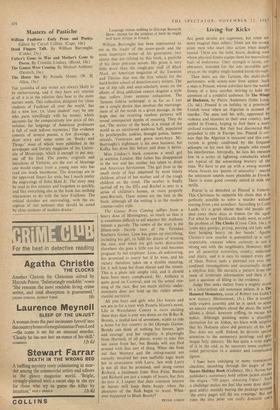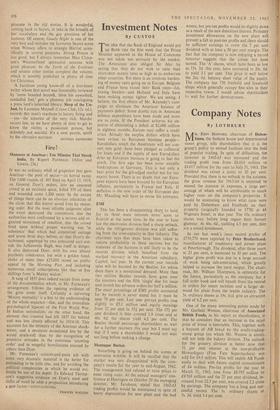Living for Kicks
ALL good sleuths are supermen, but some are more magical than others. There are the strong silent men who snarl into action when deeply roused. There are the bold, brave, dashing ones whose physical fitness equips them for marvellous feats of endurance. Their strength is latent, un- obtrusive, hoarded for the one incredible get- away,or the mighty single-handed break-through.
Then there are the Tarzans, the multi-thrill performers with ninety-nine lives apiece. Such a man is Pinaud, whose activities have the muted frenzy of a busy acrobat striving to hold the attention of a youthful audience. In The Wings of Darkness, by Pierre Audemars (John Long, 12s. 6d.), Pinaud is on holiday in a provincial French town when an Algerian is accused of murder. The man and his wife, oppressed by violence and injustice in their own country, had settled in France, hoping to find there a more civilised existence. But they had discovered that prejudice' is rife in Europe too. Pinaud is cer- tain that the Algerian is innocent' and this con- viction is grimly confirmed by the frequent attempts on his own life by people who resent his interference. Intrepidly, he lays his enemies low in a series of lightning comebacks which are typical of the astonishing bravery of the man. We have to put up with a young woman whose breasts are 'poems of sensuality': maybe the sentiment sounds more plausible in French. There is some good comedy mixed in with the thrills.
Poirot is as detached as Pinaud is frenetic. This Christmas he supports his claim that it is perfectly possible to solve a murder without moving from your armchair. According to Colin Lamb, it's a great shame that old people are 'shut away these days in homes for the aged. For what he and Hardcastle badly need, to solve the problem of The Clocks (Crime Club, 16s.), is 'some nice gossipy, prying, peering old lady with time hanging heavy on her hands.' Agatha Christie's new murder is committed in a very respectable crescent where curiosity is not a strong suit with the neighbours. However, they are all powerful eccentrics, cranky, malicious and jittery, and it is easy to suspect every one of them. Poirot casts a paternal eye over the confused investigations and occasionally drops a sibylline hint, He extracts a pattern from the mass of irrelevant information and then it is just a question of filling in the evidence.
Judge Dee seeks shelter from a mighty storm in a labyrinthine old mountain palace. It is The Haunted Monastery, scene of Robert van Gulik's new mystery (Heinemann, 15s.). Dee is treated with evasive courtesy and he is quick to sense an uneasy atmosphere about the place. He never allows a detail, however trifling, to escape his notice. Although painting seems a plausible recreation for an Abbot, we learn with surprise that his Holiness often did portraits of his cal. Dee does not scoff. Indeed, he devotes special attention to the monastery paintings and 1,0 0" tesque holy statuary. He has quite a testy night of it in the end, as he uncovers some sophisti- cated perversion in a sinister and complicated jigsaw.
I have been indulging in many reminiscent chuckles, thumbing through the pages of the Sayers Holiday Book (Gollancz, 18s.). Across her publisher's customary bold yellow jacket streaks the slogan—'700 pages. Amazing Value!' Such a challenge makes me feel like some dour deter- gent addict sensibly buying the package because i
,:
'the extra pages will fill ten evenings.' But not '. even the tiny print can really diminish one's
pleasure in the old stories. It is wonderful, coming back to Sayers, to take in the breadth of her vocabulary and the gay precision of her humour. Of course, Gaudy Night is one of the very best and includes my favourite Sayers scene when Wimsey offers to strangle Harriet scien- tifically in several positions. Strong Poison is less good, but I always remember Miss Climp- son's Westmorland spiritualist sessions with great pleasure. In the Teeth of the Evidence and sixteen other stories complete the volume, which is sensibly published in plenty of time for Christmas.
A facetious young know-all of a free-lance writer whose first novel was favourably reviewed by 'some bearded beatnik, bless his unwashed, sandalled feet,' gets a plummy job cataloguing a press lord's inherited library. Sleep of the Un- just, by Laurence Meynell (Crime Club, 12s. 6d.), records this man's reactions to luxury living and —yes--the miseries of the very rich. Murder occurs late, so we have plenty of time to get to know the victim, a passionate person, but definitely not suicidal. It's a neat puzzle, spoilt



































 Previous page
Previous page